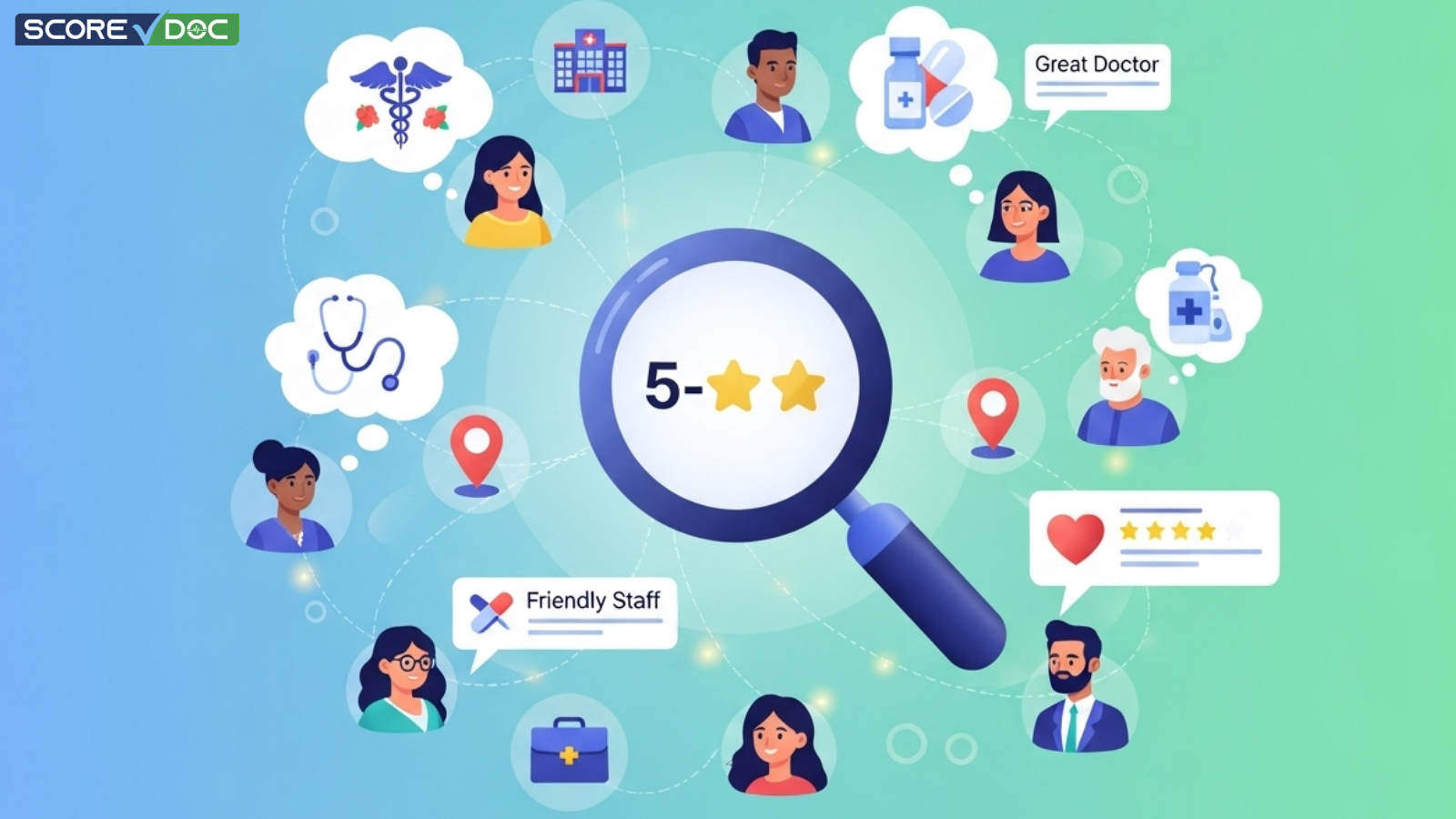Why You Need to Stop Toggling Between Doctor Review Sites: The Power of Healthcare Review Aggregation

The Unspoken Frustration of Modern Patient Research
Finding a new healthcare provider today often feels less like a simple search and more like a full-scale research project. We open one tab for Google reviews, another for Healthgrades, a third for WebMD, and a fourth for a specialty-specific forum. We spend precious hours cross-referencing star ratings, deciphering fragmented comments, and trying to reconcile conflicting information.
The result? We’re left with a confusing, incomplete picture of a provider's reputation. A doctor with a perfect 5-star rating on one site might have a string of 1-star reviews on another, leaving us feeling more overwhelmed and anxious than when we started.
The problem isn't a lack of reviews; it's the fragmentation of those reviews across a dizzying number of platforms. This is where a revolutionary concept steps in: healthcare review aggregation. It's the solution to a problem millions of patients face daily, and it's set to fundamentally change how we find trusted care.
What Exactly is Healthcare Review Aggregation?
At its core, healthcare review aggregation is the process of collecting, consolidating, and analyzing patient feedback from multiple online platforms into a single, comprehensive report. Think of it as a financial dashboard for a doctor's reputation, where you can see all your accounts (reviews from various sites) in one place.
The process typically involves advanced technology, including:
Data Sourcing: An aggregator platform automatically pulls publicly available reviews and ratings from dozens of trusted sources, including Google, Healthgrades, Zocdoc, WebMD, Vitals, and more.
Consolidation: All of this fragmented data is then compiled into a single profile for each provider.
AI-Powered Analysis: This is the most critical step. The technology goes beyond simply compiling data; it uses sophisticated AI and natural language processing (NLP) to analyze thousands of individual comments. This analysis identifies recurring themes and sentiment trends, such as consistently positive feedback on "bedside manner" or repeated mentions of "long wait times."
The outcome is a holistic, unbiased view of a provider’s reputation, a review scorecard that presents a clear narrative, not just a collection of disconnected data points.
The "Why": Beyond Convenience, The Need for Deeper Truth
The reason healthcare review aggregation is not just a convenience but a necessity is because it solves a number of critical problems inherent in the fragmented review landscape.
1. It Eliminates the Problem of Single-Platform Bias
Imagine you’re looking for a new pediatrician. You find one with an impeccable 4.9-star rating on a popular directory. Feeling confident, you book an appointment. What you didn't see was their low 3.2-star rating on a local parenting forum, where several parents mentioned a difficult front-desk staff.
Aggregated reviews remove this bias. They provide a balanced, multi-source perspective that prevents a skewed picture. According to a study by rater8 cited in Medical Economics, over half (51%) of patients read at least six reviews before making a decision, highlighting the need to look beyond a single source.
2. It Reveals Actionable Trends, Not Just Isolated Incidents
A single negative review about a "rude receptionist" might be a one-off bad day. But what if you see 20 different comments across five different websites over the last year mentioning the same issue? That's not an incident, that's a trend.
This is the true power of aggregation. It moves beyond anecdotal evidence to identify consistent patterns in patient experience. Aggregators can highlight:
- Positive Trends: Consistently praised for "attentive care" or "effective communication."
- Negative Trends: Repeated feedback on "excessive wait times" or "lack of clear billing information."
This data turns isolated opinions into meaningful feedback for both patients and providers.
3. It Fights Back Against the Scourge of Review Fatigue
Modern patients are suffering from review fatigue. A recent survey revealed that the average patient checks 4-6 different review sites before making a decision. This not only drains their time but also increases their anxiety.
Review aggregation condenses this entire process into a single, efficient step. By consolidating data, patients can get the full picture in minutes instead of hours, allowing them to focus on what matters: their health. This efficiency is critical, especially when dealing with urgent or emotionally charged healthcare decisions.
4. It’s an Invaluable Tool for Healthcare Providers, Too
While the primary benefit is for patients, review aggregation is an essential tool for providers who are serious about managing their online reputation and improving their practice.
- A Unified Reputation Dashboard: Instead of checking multiple sites to see what patients are saying, providers can see their entire online reputation on a single dashboard. This allows for quick, holistic monitoring.
- Data-Driven Practice Improvement: Aggregated trends highlight a practice's strengths and weaknesses with clarity. A provider can see that they consistently get high marks for clinical excellence but low scores for appointment scheduling. This data provides a clear roadmap for where to invest resources to improve the patient experience.
- Attracting the Right Patients: A verified, comprehensive profile built on aggregated data is a powerful signal of trustworthiness and transparency. It helps a practice attract new patients who value honest feedback and data-backed reputations.
The Future of Patient Research: The New Standard
Healthcare review aggregation is not a temporary trend; it’s the new standard for informed decision-making. As patients become more data-savvy, they will demand a clear, complete, and unbiased view of their healthcare options. Platforms that provide a consolidated, AI-powered summary will define the next generation of healthcare directories.
Frequently Asked Questions
Q: Is healthcare review aggregation legal?
A: Yes. Aggregation platforms only collect publicly available data that has already been published on the internet by patients. They do not publish private information. The process is similar to how a search engine crawls and indexes content from across the web to display search results.
Q: How is review aggregation different from a simple doctor directory?
A: A traditional directory is a list of doctors, often with basic contact information and perhaps a single star rating. A review aggregator like ScoreDoc is a sophisticated platform that provides a detailed, data-backed analysis of a provider's reputation, synthesizing information from multiple sources to give you a complete picture.
Q: Can I trust the reviews that are aggregated?
A: Reputable aggregators, like ScoreDoc, use advanced algorithms and AI to identify potential fake or malicious reviews. By analyzing a high volume of data from multiple sources, it becomes easier to spot trends and filter out outliers, providing a more reliable and trustworthy overall score.
Q: How does aggregation handle both positive and negative reviews?
A: Aggregation provides a balanced view. Instead of hiding negative reviews, it incorporates them into the overall analysis. The real value is in identifying trends. A single negative comment is just one data point, but if a similar concern appears across dozens of different reviews, the aggregator will highlight that as a key trend, giving you a more honest and realistic view.
Conclusion: A New Era of Patient Confidence
The days of frustrating, fragmented searches for a new doctor are over. ScoreDoc delivers a new era of patient confidence, giving both patients and providers the clarity, confidence, and transparency they need to make better decisions. It's about moving from a collection of incomplete snippets to a single, complete story—the full, honest truth about a provider's reputation.
This new standard empowers you to take control of your healthcare choices, saving you time and giving you the peace of mind you deserve.


